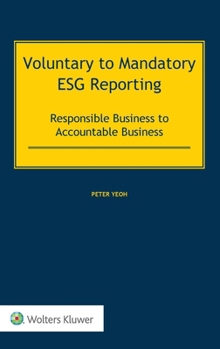Voluntary to Mandatory ESG Reporting: Responsible Business to Accountable Business
Focusing on the impacts of environmental, social, and governance (ESG) matters, companies, financial institutions, and regulators are continually seeking sustainability-driven models and standards on ESG themes in the sourcing, design, and provision of products and services. This welcome and thoroughly researched book, by a well-known authority in corporate and financial services law, engages with developments in ESG soft and hard law as business responsibility shades into business accountability.
The author offers a sweeping, in-depth consideration of the current and future role of ESG reporting and compliance, encompassing such issues and topics as the following:
purpose and forms of regulation for non-financial reporting;
mandatory ESG reporting implementation issues;
role of the company board;
recognition of threats posed by 'greenwashing' and similar tactics;
clean energy versus sustainable supply chains;
limits and weaknesses of ESG reporting;
help from AI and other software solutions; and
progress in the global quest for a universal ESG reporting standard.
Although some companies retain their social and political licences to operate and thwart ESG, robust data and persuasive contentions worldwide show that deliberations on how best to promote global sustainability in the long term have become standard business practice. Accordingly, this book clearly demonstrates how including ESG in business decisions ultimately contributes to stable and predictable markets. Its insights and guidance will be greatly appreciated by all those needing to engage with ESG reporting, whether lawyers, investors, regulators, business stakeholders, or academics.
Related Subjects
Law




